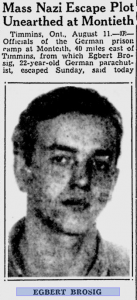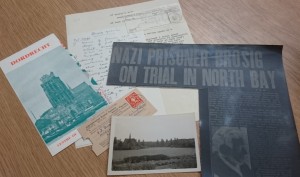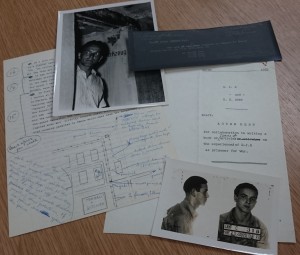This is the third in our series of blog posts celebrating the 75th anniversary of the Giles Family, drawing on the riches of the Carl Giles Archive, which has been part of the British Cartoon Archive since 2005. This series is in lieu of a physical exhibition in our Gallery space, owing to the Covid-19 pandemic.
As mentioned in earlier blog posts, the 20th century saw huge changes to society on both politically and socially. Over the course of their 46 year existence, the one thing that didn’t change fundamentally was the Giles family: everyone remained the same age, with the same characteristics and the same roles within the group. This stasis allowed Giles to use the family to explore social, cultural and political changes in ways that other editorial cartoonists could not: the reader already has a shared knowledge of the people within the cartoons and how they will behave, much like in our own families. This blog post will explore some of the ways in which the Giles family reacted to key UK events in the second half of the 21st century. We could write an entire series of blogs on how Grandma et al discussed British society – so here are some of our highlights.
The Giles family and women
The 20th century saw great shifts to women’s roles in society – from getting the vote in 1918 to the development of the contraceptive pill in 1961, feminism and equal rights have constantly been fought for and their impacts discussed. The 1970s saw the growth of the Women’s Liberation Movement (WLM), a group which demanded equal rights, equal education and careers, free contraception and abortion and free childcare. 1973 was a crucial year for feminists: the first WLM conference was attended by over 600 women, the UK Rape Crisis network established, and Brixton Black Women’s Group and Virago Press were formed. This discourse did not escape the Giles family – especially Grandma, who decided to stage her own protest:
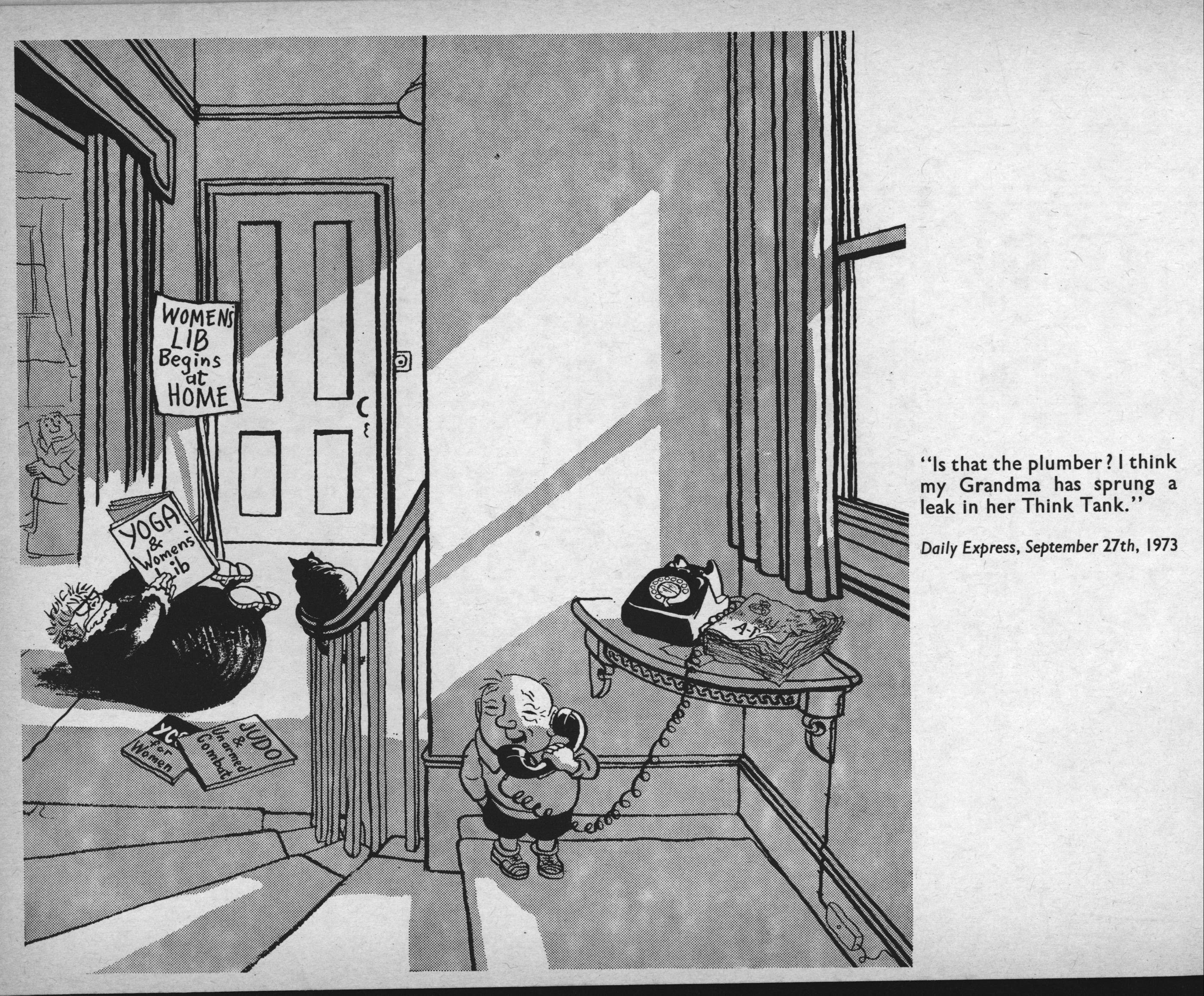
“Is that the plumber? I think my Grandma has sprung a leak in her Think Tank.” – Carl Giles, Daily Express, 27 September 1973 (Image ref: 25147)
Like many British families, gender roles are frequently discussed in the Giles family – but it’s clear who’s really in charge. This 1979 cartoon sees women attempting the Christmas shopping and discussing what to get their husbands; although not directly about the Giles family, Grandma can be seen causing mischief in the background:
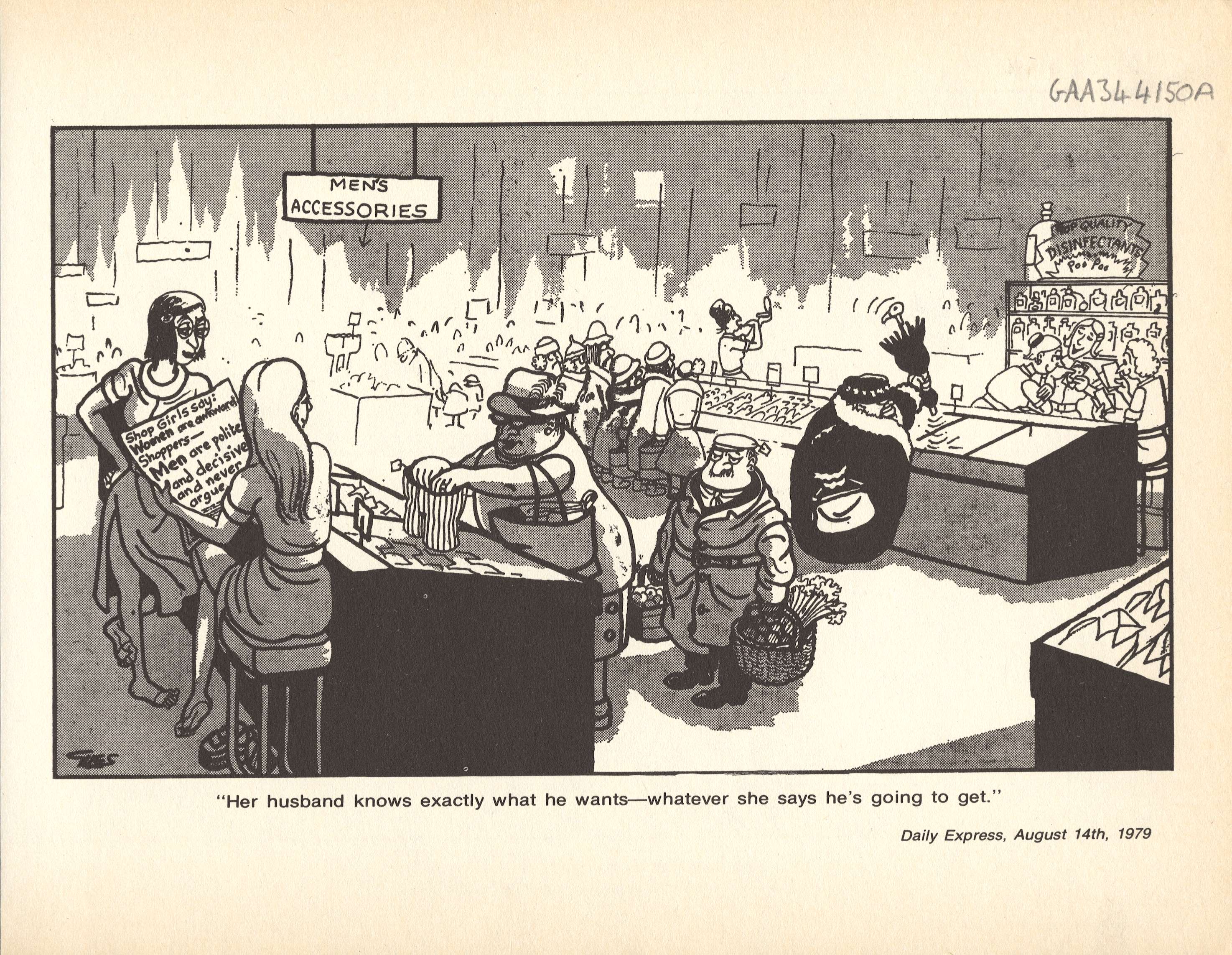
“Her husband knows exactly what he wants – whatever she says he’s going to get.” – Carl Giles, Daily Express, 14 August 1979 (Image ref: GAA344150A)
While Giles’ cartoons never ventured into the risqué, it would be impossible to ignore sexuality in all its many forms. In the top image, George Junior finds a world better than Santa; in the lower, Giles responds to a reader comment asking what women dislike about men – the answer is joyfully predictable:
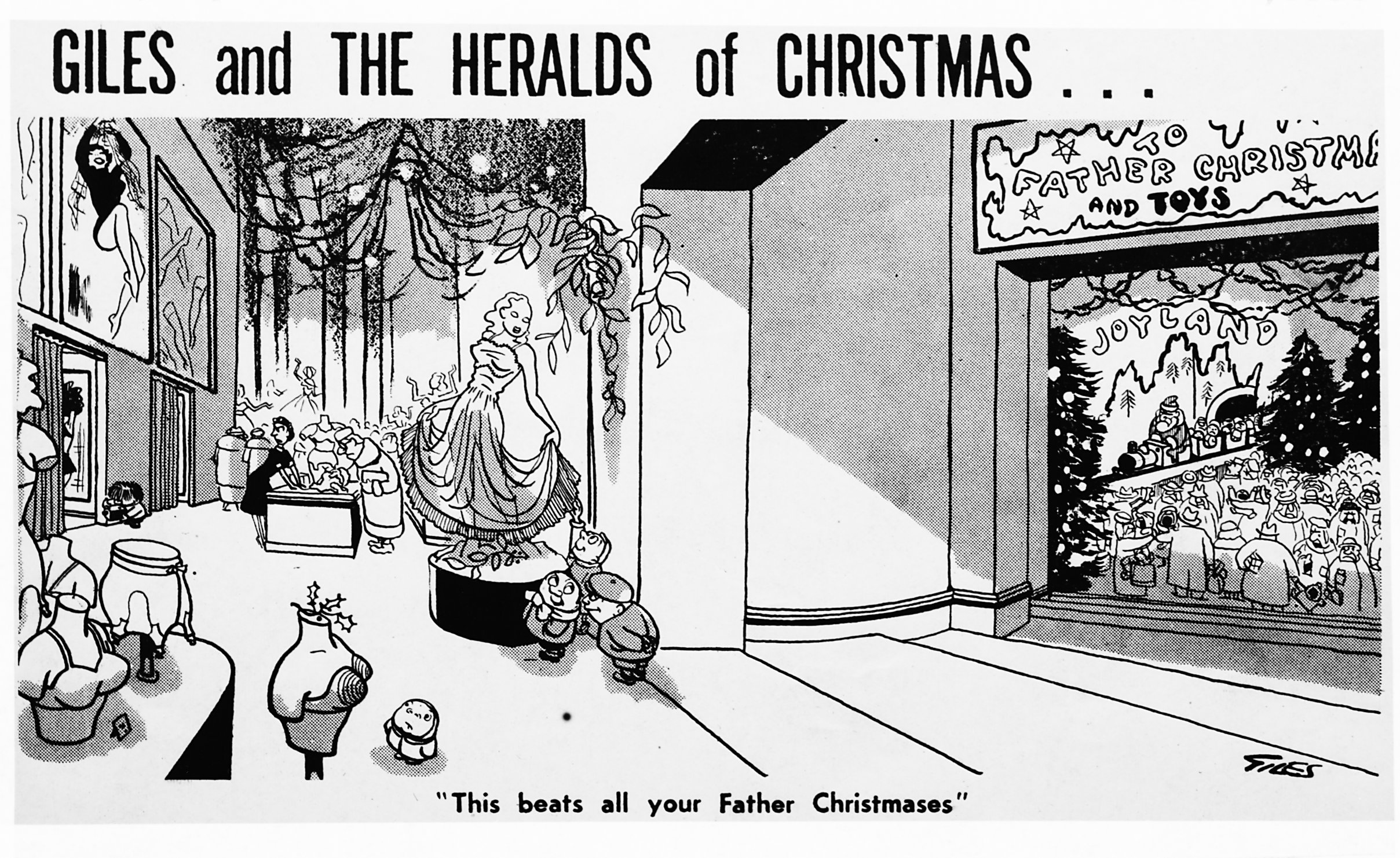
“This beats all your Father Christmases.” – Carl Giles, Daily Express, 11 December 1956 (Image ref: GAN0166)
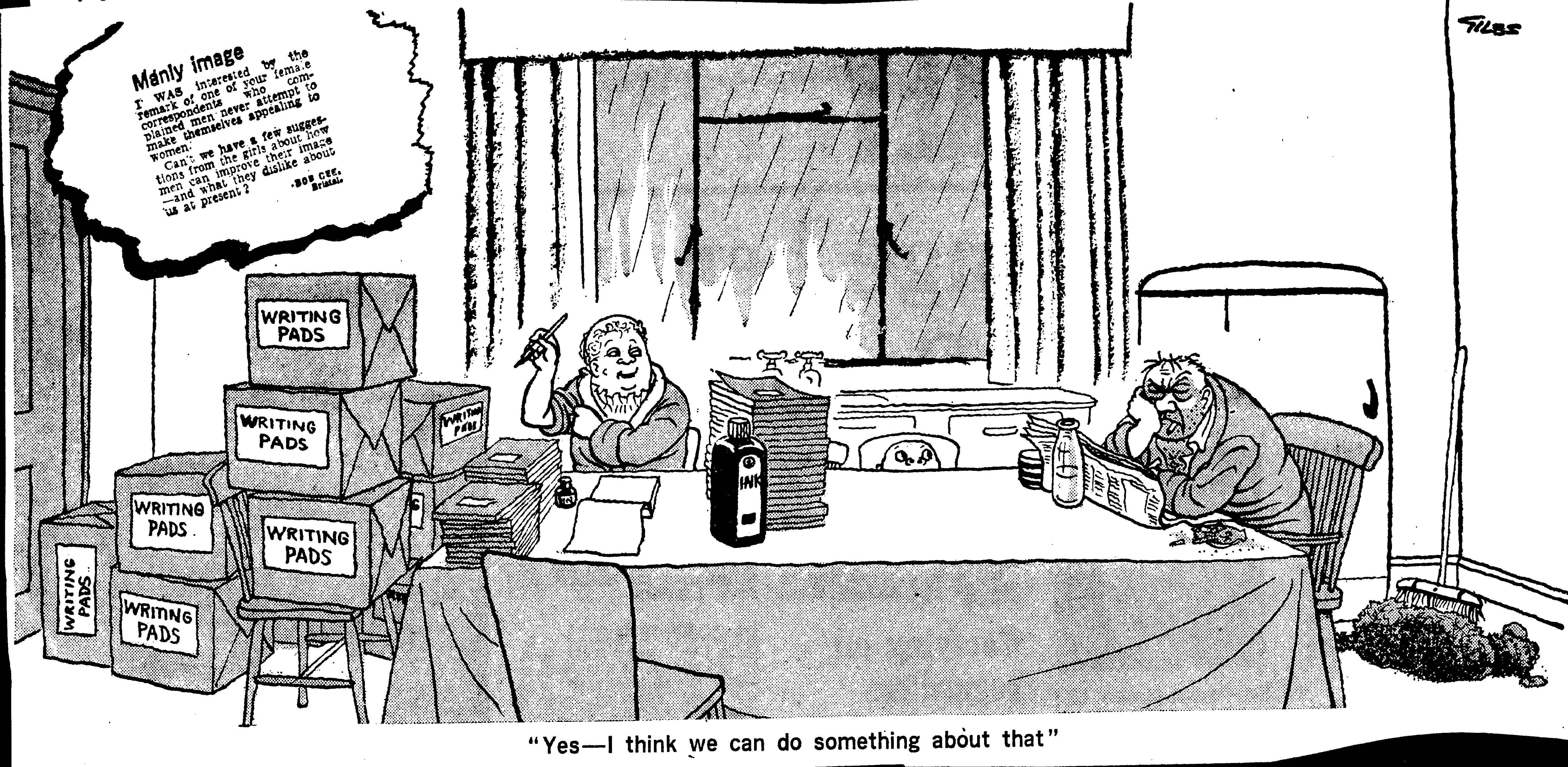
“Yes – I think we can do something about that” – Carl Giles, Daily Express, 13 August 1974 (Image ref: 26618)
Women also played crucial roles during the Second World War and after. Alongside the Women’s Voluntary Services (formed in 1938), women also wanted to play an active part in defending their country. Although not initially permitted to join the Home Guard, the Women’s Home Defence was formed in 1941. Here, the Giles Family are debating about the long-term wisdom in this decision – but who wouldn’t be scared of Grandma having access to weapons?!
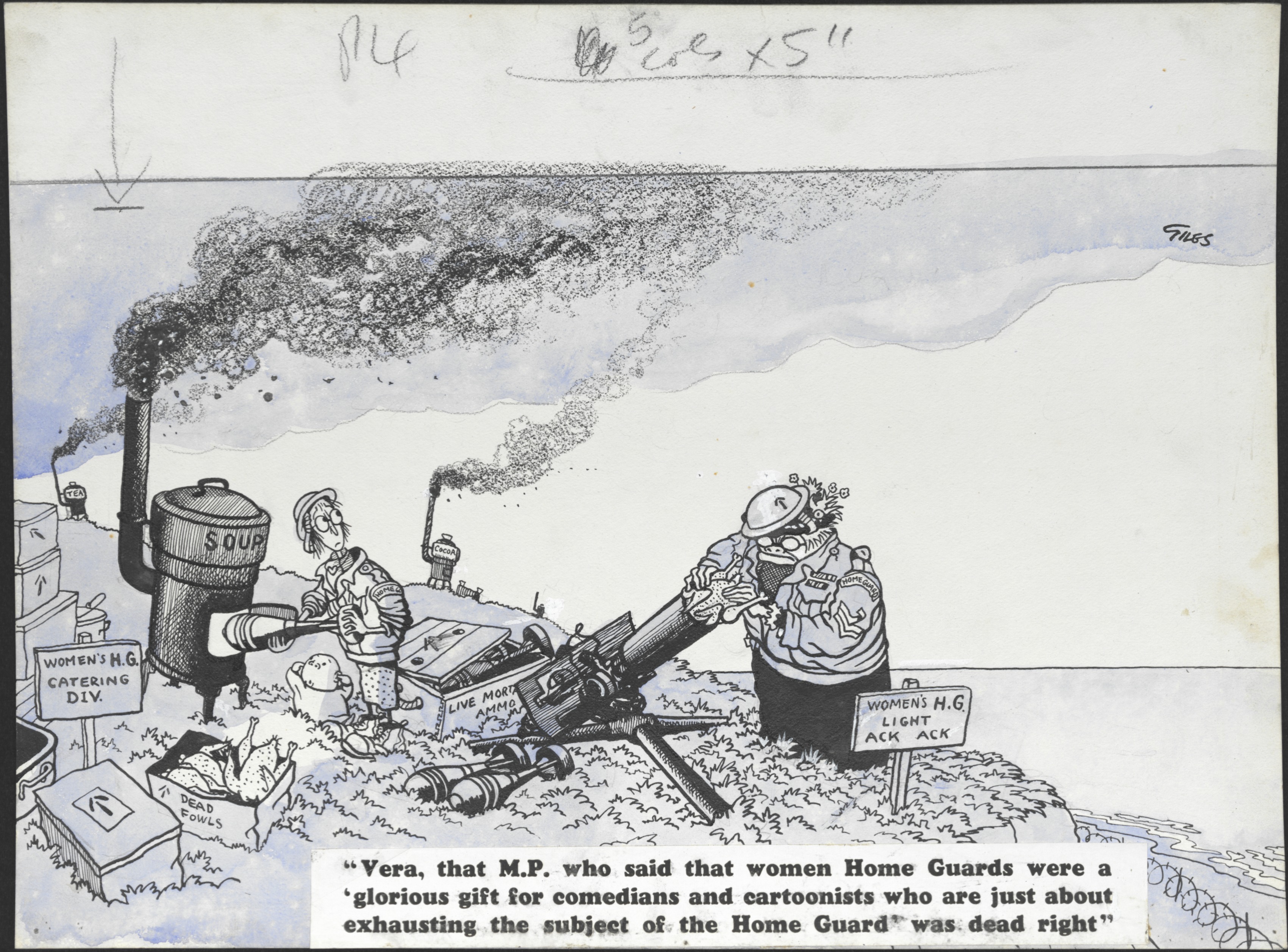
“Vera, that M.P. who said that women Home Guards were a ‘glorious gift for comedians and cartoonists who are just about exhausting the subject of the Home Guard’ was dead right” – Carl Giles, Daily Express, 29 November 1951 (Image ref: GA0686)
The Giles family and War
Like many British families, Giles’ characters all interact with the aftermath of the Second World War in different ways. It is assumed that Father fought in the Second World War, but Giles never clarifies this: the only hint we get is in a cartoon from May 1950. Father is pictured reading a paper whilst his son George (also in army uniform) brings him tea. However, there’s an implication that (true to his nature) Father never actually does any work of importance whilst he’s on duty – the action is happening elsewhere:
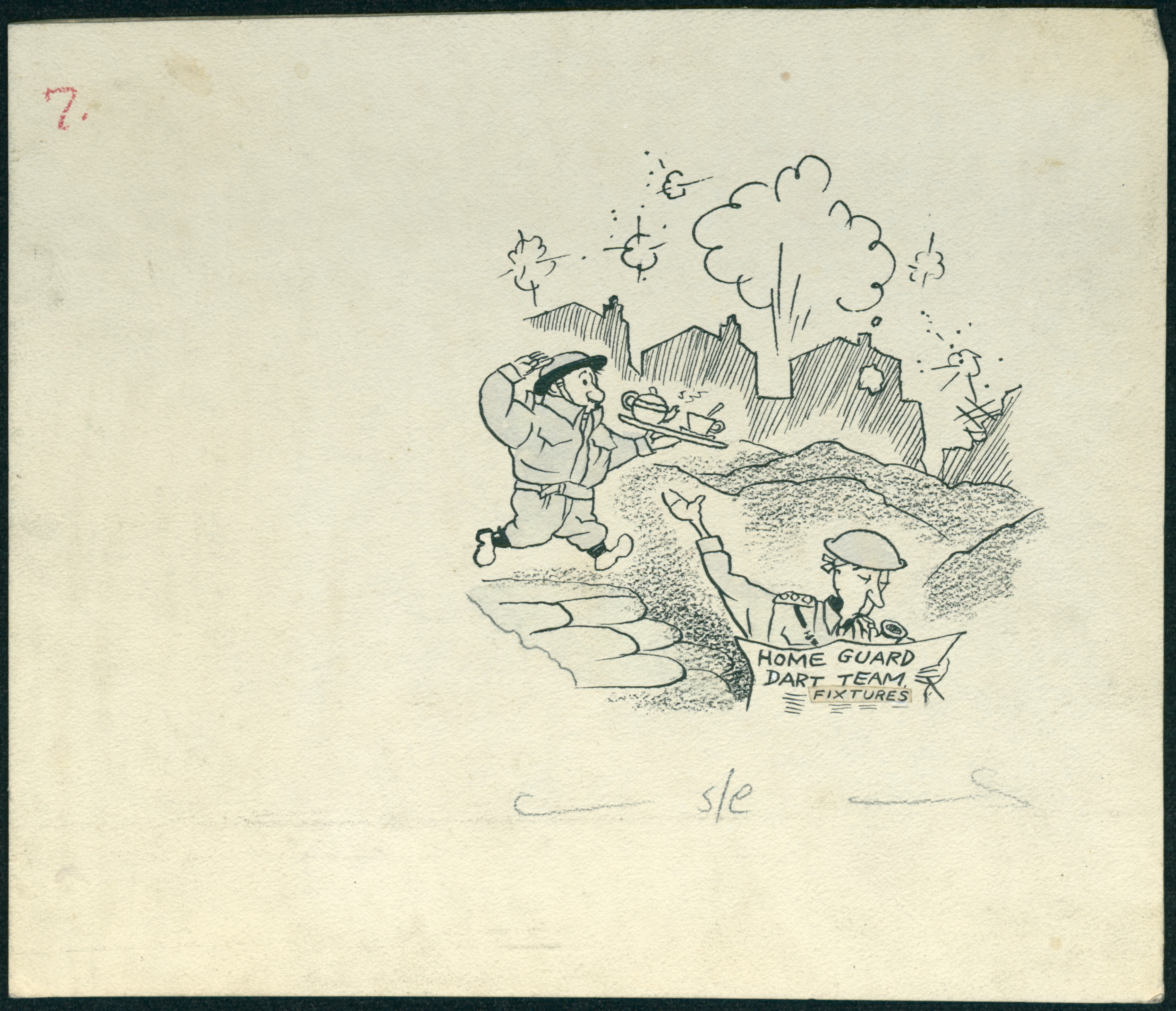
“1939 – and here he is winning his second war.” – Carl Giles, Daily Express, 5 January 1950 (Image ref: GA5392)
Even when the War is over, its ramifications live on through the Giles family – much like it did for Giles himself, who noted that his political views had been forever shaken by what he saw at the liberation of Bergen-Belsen concentration camp in May 1945. As families readjusted to life after soldiers came home the Giles family echoed this divide as seen here in February 1946:
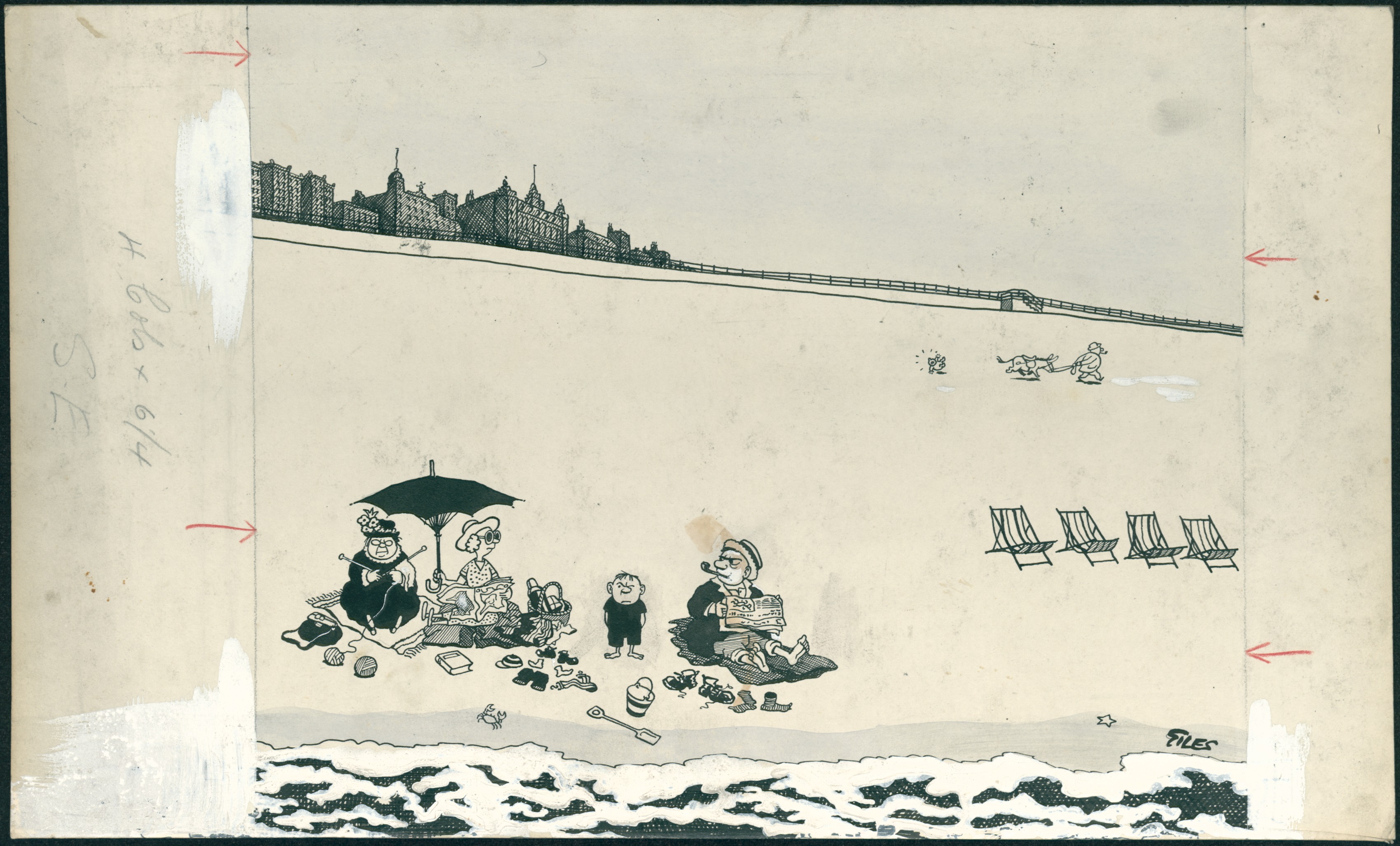
“So, I bring him to see the sea for the first time and he says he’d sooner see a good air raid any day” – Carl Giles, Daily Express, 21 February 1946 (Image ref: GA0089)
Here we can see that some of the Giles family have taken a much-needed visit to the seaside (it’s never stated exactly where they live but we assume it’s in the suburbs around London). However Father is less than impressed with the views from the beach, as Mother notes – domestic life lacks the excitement and thrill of air raids experienced by parts of the country during the Blitz.
For many families the end of the war didn’t mean a complete shift back to everyday life – in Britain rationing continued in some forms until 1954, with certain goods becoming sparser after 1945. Rationing was a real concern for many families and of course the Giles family also struggled:
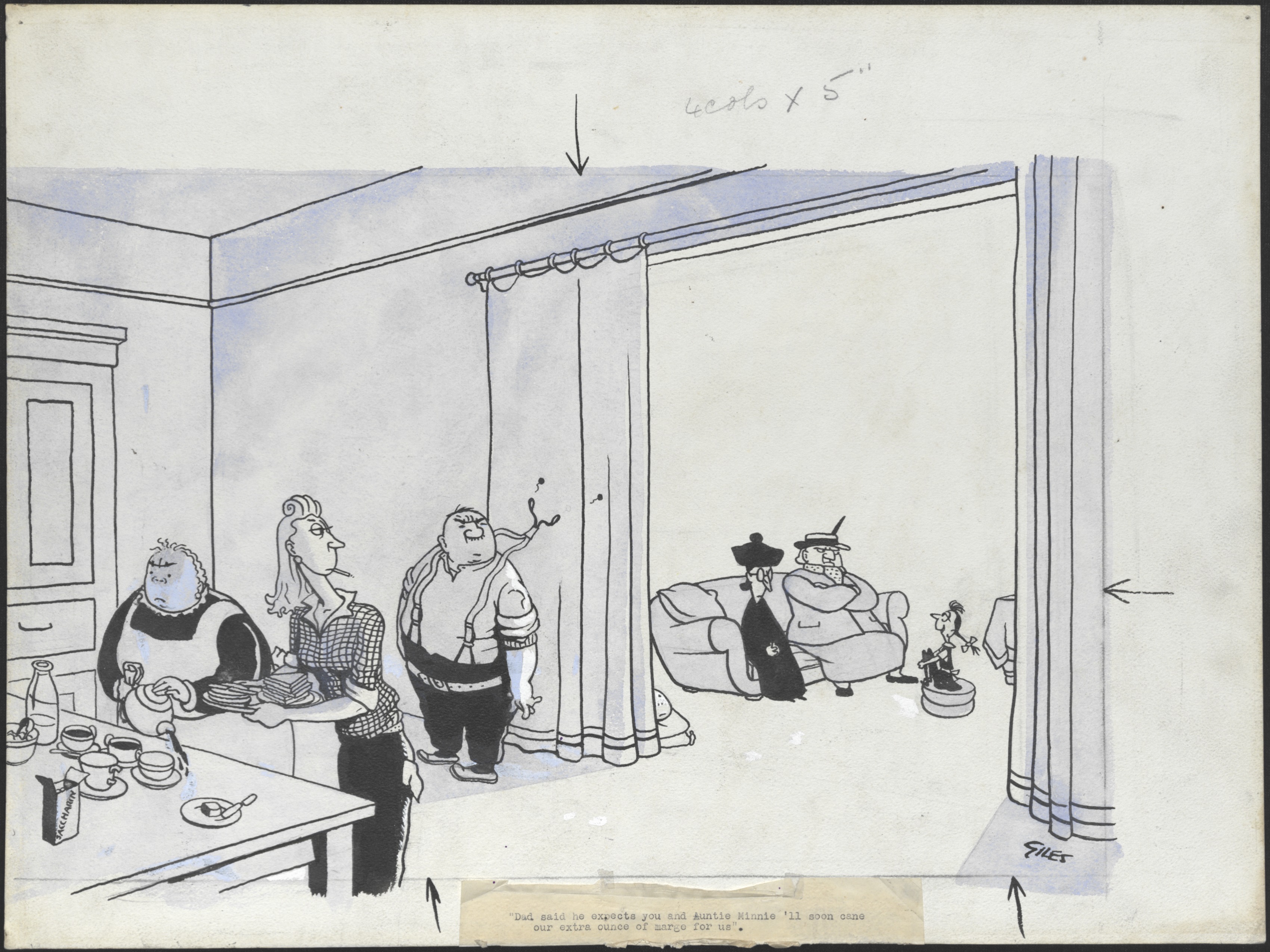
“Dad said he expects you and Auntie Minnie’ll soon cane our extra ounce of marge for us.” – Carl Giles, Daily Express, 16 January 1948 (Image ref: GA0240)
Despite the war’s end being seen as a new start for many, some things never changed domestically and the Giles family reflected this. Much like New Year’s resolutions, some promises were just made to be broken:
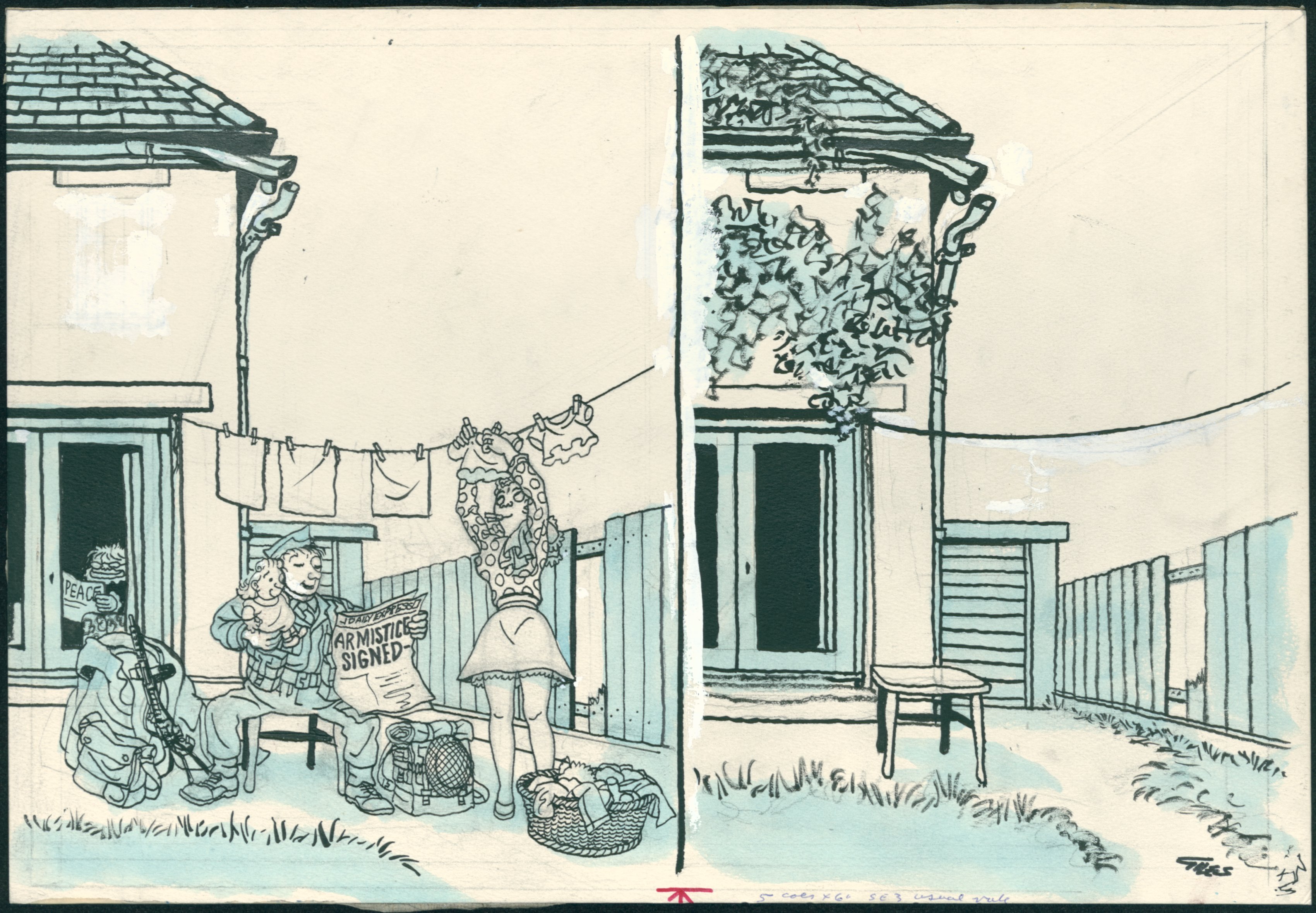
‘VE Day 1945: “Now it’s over, I’ll get some leave and repair that gutter and put a couple of boards in that fence.” VE Day 1985’ – Carl Giles, Sunday Express, 5 May 1985 (Image ref: GA4798)
If you’re interested in how cartoonists explored the Second World War in particular check out our blog post about VE day through the British Cartoon Archive.
The Giles family and welfare
The question of how (and to what extent) the government should care for its citizens has been at the heart of society for hundreds of years. In the UK’s post-WW2 era one of the most significant developments – the creation of the NHS in July 1948 – affected everybody, largely for the better. Giles frequently supported the NHS and local hospitals (he created a book they could sell in 1975) so it isn’t surprising that the Giles family pop up in medical contexts from time to time, even if it’s not for obvious reasons:
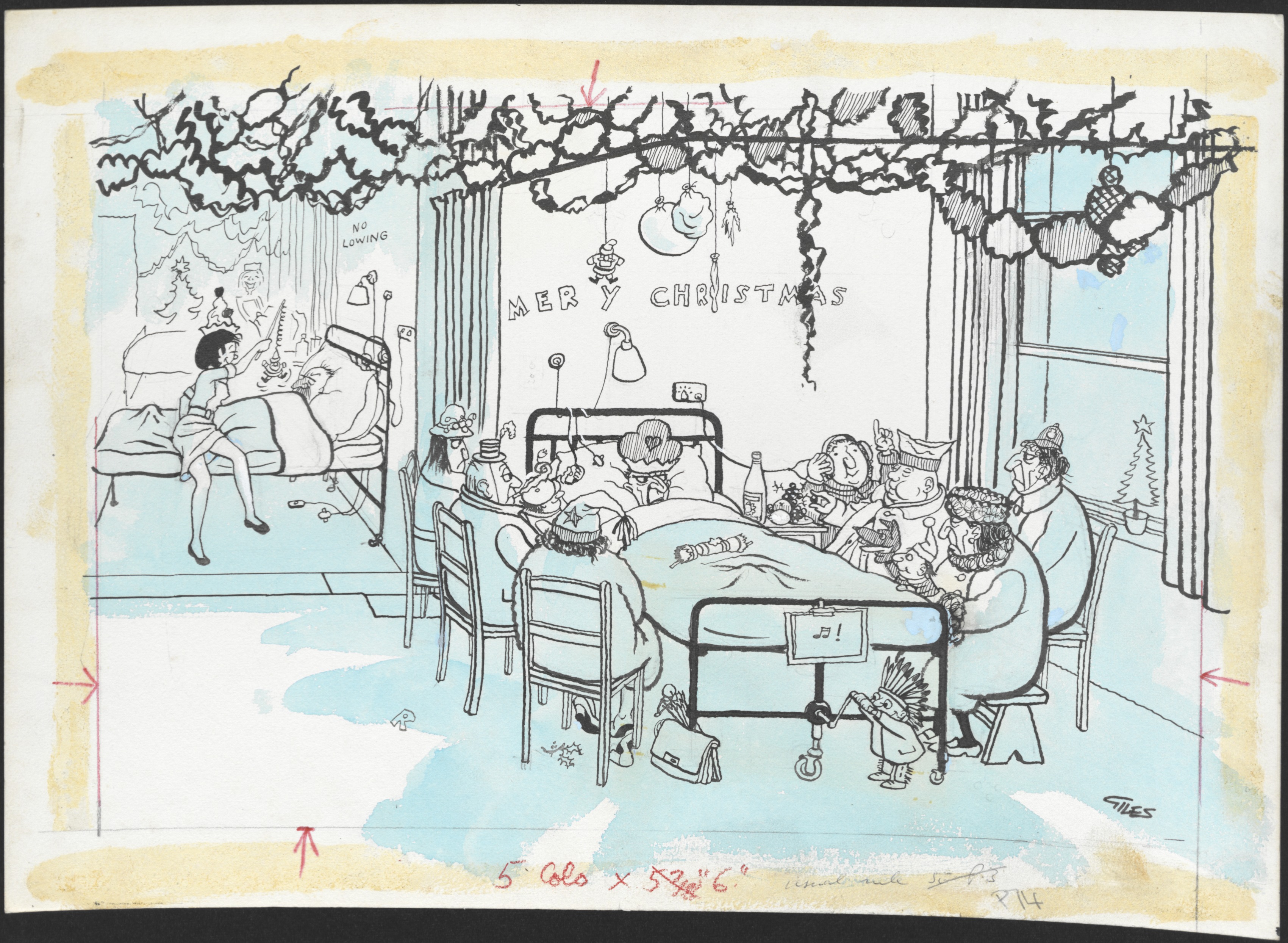
“You lot aren’t here to bring me comfort and joy – you’re here to save your blooming light and heating at home.” – Carl Giles, Sunday Express, 23 December 1973 (Image ref: GA3239)
The NHS has constantly been on politicians’ agendas; one of the early debates related to how much to charge patients for prescriptions. In 1952 the Conservative government introduced a charge to be paid by everyone who needed prescribed medicine but the cost doubled over 12 years, so in 1964 this fee was abolished by the Labour government. Whilst in theory this may seem a generous move it also allowed people to avoid paying for everyday medicines (such as painkillers) by getting their GP to prescribe them:
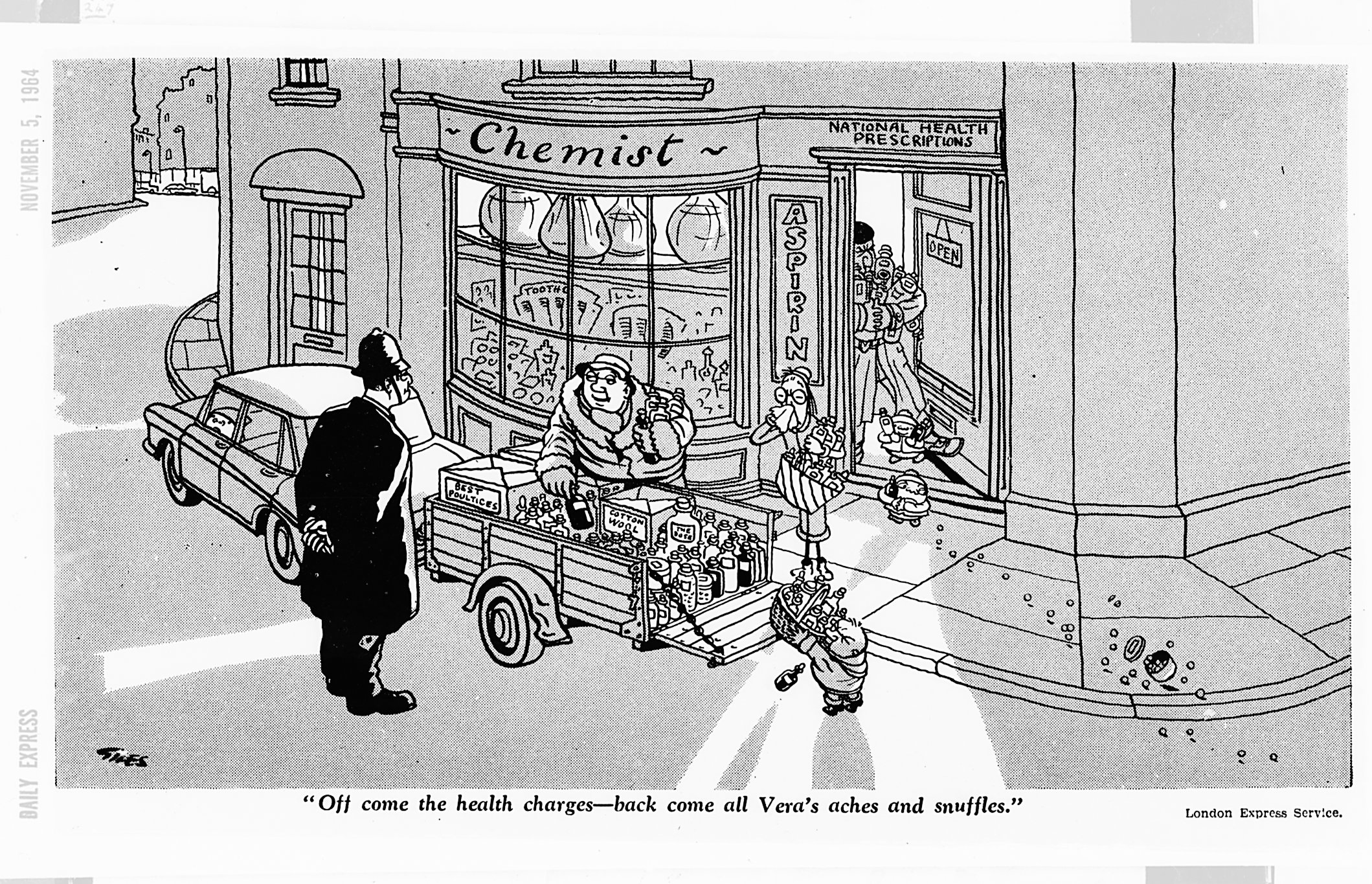
“Off come the health charges – back come all Vera’s aches and snuffles.” – Carl Giles, Daily Express, 5 November 1964 (Image ref: GAN1268)
Of course, welfare extends beyond medical matters and into the world of work and wellbeing. The miners’ strikes of the 1970s and 1980s impacted many families across the country. As ever, Giles never explicitly used his artwork to make a political comment but the Giles family said what many people thought:
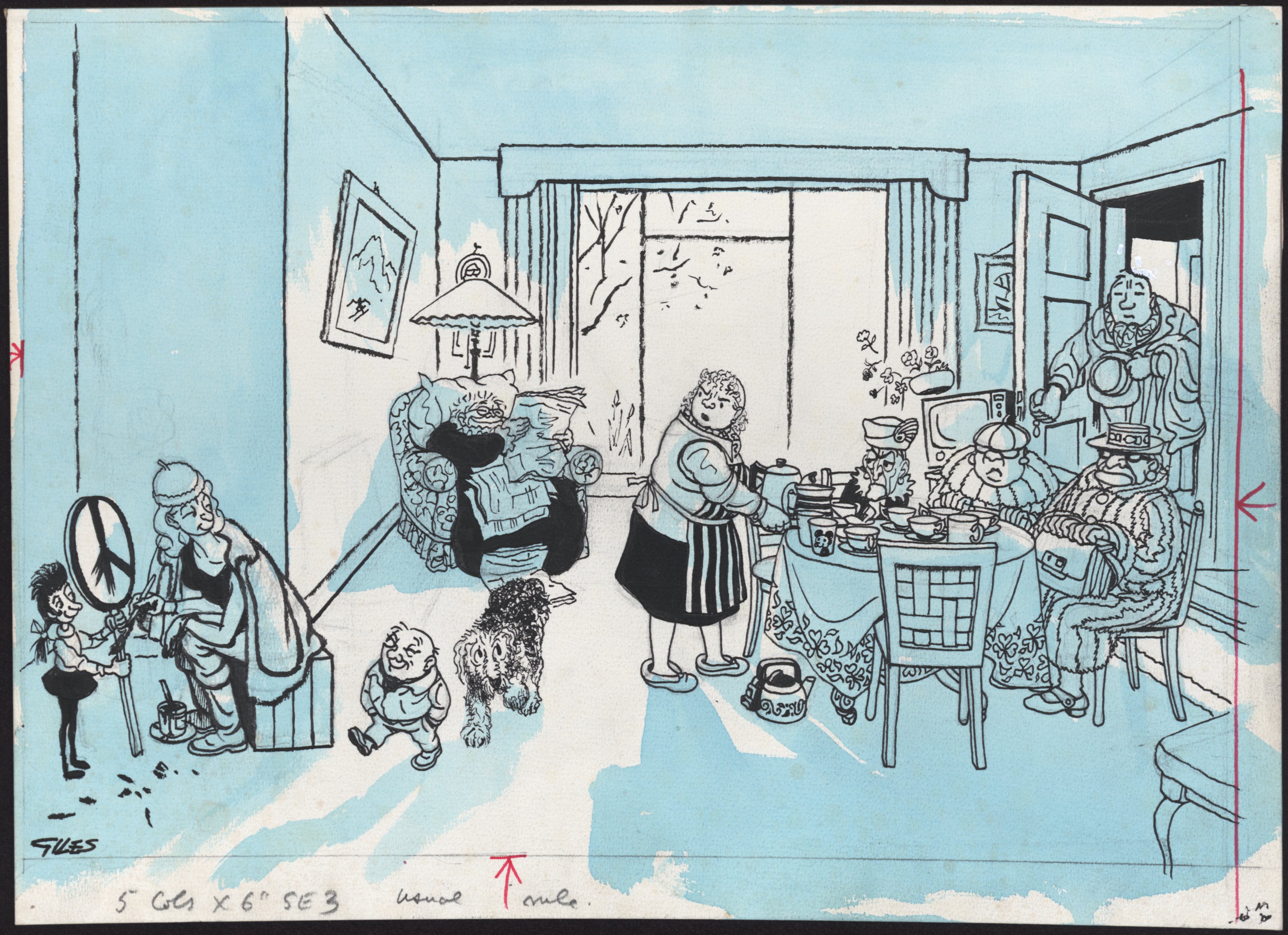
“That was very rude to tell Aunty that a couple of weeks at the coalface would make her think differently about the miners’ strike” – Carl Giles, Sunday Express, 6 March 1983 (Image ref: GA4507)
Prime Minister Margaret Thatcher’s 21 years in power are remembered by many for the reforms she made to the welfare state, privatising nationalised industries and weakening trade union power. The Giles family did not escape Thatcher’s gaze – as Stinker hypothesizes when watching Grandma:
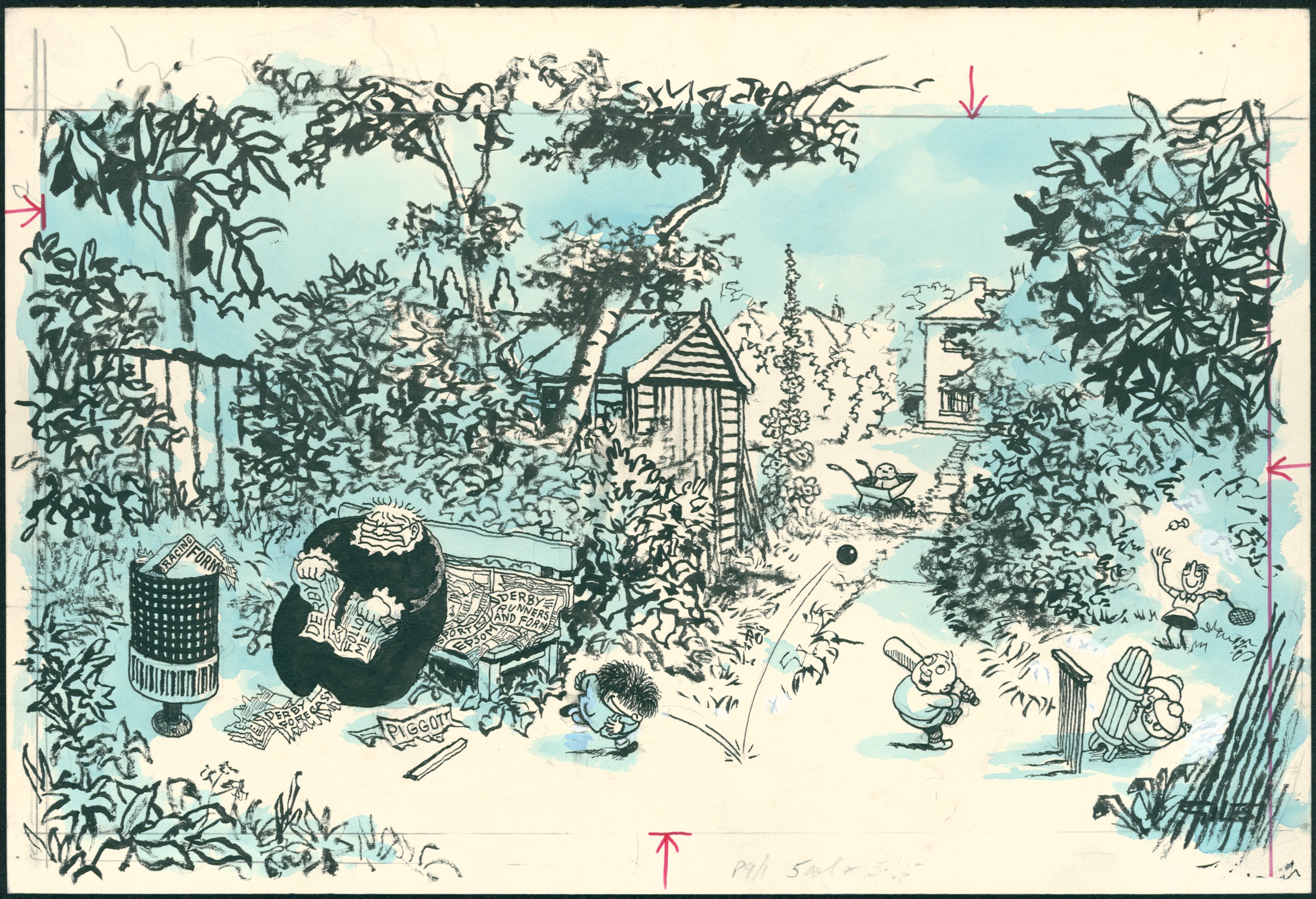
“Mrs Thatcher would certainly give Grandma’s State Benefits a radical overhaul if she knew they all went on Lester Piggott yesterday.” – Carl Giles, Daily Express, 6 June 1985 (Image ref: GA4810)
As mentioned above, we could write a whole series on how Giles discussed political and social matters – hopefully this blog has given you a taste for exploring through our Giles Archive even more. Two quotes below sum up, for us, the popularity of the Giles family:
“A Giles book of cartoons is also a day by day, week by week record of English history as it. happens. Look at the cartoon and look at the date and you will find you are living recent history over again.” (Nathaniel Gubbins, Introduction to the Third Giles Annual, 1948)
“As I grow older…there tend to be more and more mornings when you look through the newspaper and realise that the only credible figure left in British public life is Grandma.” (Dennis Norden, Introduction to the Thirty-Fourth Giles Annual, 1980)
What are your favourite memories of the Giles family? How did they reflect (or impact) your political and social views over the years? We’d love to hear your thoughts!
References:
Tim Benson, ‘Giles’ War’ (2017)
BBC, ‘WW2 People’s War: Girls in the Home Guard’, https://www.bbc.co.uk/history/ww2peopleswar/stories/40/a4036240.shtml
BBC, ‘The cost of being sick’, http://news.bbc.co.uk/1/hi/uk/61404.stm
British Library, ‘Sisterhood and after: Timeline of the Women’s Liberation Movement’, https://www.bl.uk/sisterhood/timeline

